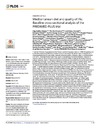Identificador persistente para citar o vincular este elemento:
https://accedacris.ulpgc.es/jspui/handle/10553/41977
| Título: | Mediterranean diet and quality of life: Baseline cross-sectional analysis of the PREDIMED-PLUS trial | Autores/as: | Galilea-Zabalza, Iñigo Buil-Cosiales, Pilar Salas-Salvadó, Jordi Toledo, Estefania Ortega-Azorín, Carolina Díez-Espino, Javier Vázquez-Ruiz, Zenaida Zomeño, María Dolores Vioque, Jesús Martínez, José Alfredo Romaguera, Dora Perez-Farinos, Napoleón López-Miranda, José Estruch, Ramón Bueno-Cavanillas, Aurora Arós, Fernando Tur, Josep Antoni Tinahones, Francisco Serra-Majem, Lluis Marcos-Delgado, Alba Ortega-Calvo, Manuel Vázquez, Clotilde Pintó, Xavier Vidal, Josep Daimiel, Lidia Delgado-Rodríguez, Miguel Matía, Pilar Corella, Dolores Diaz-López, Andrés Babio, Nancy Muñoz, Miguel Angel Fitó, Montse González-Palacios, Sandra Abete, Itziar García-Rios, Antonio Ros, Emilio Martínez-González, Miguel Ángel PREDIMED-PLUS Study Investigators Bautista Castaño, Inmaculada |
Clasificación UNESCO: | 3206 Ciencias de la nutrición | Palabras clave: | Physical-Activity Questionnaire Cardiovascular-Disease Health-Status Mortality Association, et al. |
Fecha de publicación: | 2018 | Publicación seriada: | PLoS ONE | Resumen: | We assessed if a 17-item score capturing adherence to a traditional Mediterranean diet (MedDiet) was associated with better health-related quality of life among older Spanish men and women with overweight or obesity harboring the metabolic syndrome. We analyzed baseline data from 6430 men and women (age 55-70 years) participating in the PREDIMED-Plus study. PREDIMED-Plus is a multi-centre randomized trial testing an energy-restricted MedDiet combined with promotion of physical activity and behavioral therapy for primary cardiovascular prevention compared to a MedDiet alone. Participants answered a 36-item questionnaire about health-related quality of life (HRQoL) and a 17-item questionnaire that assessed adherence to an MedDiet. We used ANCOVA and multivariable-adjusted linear regression models to compare baseline adjusted means of the quality of life scales according to categories of adherence to the MedDiet. Higher adherence to the MedDiet was independently associated with significantly better scores in the eight dimensions of HRQoL. Adjusted differences of > = 3 points between the highest and the lowest dietary adherence groups to the MedDiet were observed for vitality, emotional role, and mental health and of > = 2 points for the other dimensions. In conclusion, this study shows a positive association between adherence to a MedDiet and several dimensions of quality of life. | URI: | https://accedacris.ulpgc.es/handle/10553/41977 | ISSN: | 1932-6203 | DOI: | 10.1371/journal.pone.0198974 | Fuente: | PLoS ONE [ISSN 1932-6203], v. 13 (6), e0198974 |
| Colección: | Artículos |
Citas SCOPUSTM
116
actualizado el 08-jun-2025
Citas de WEB OF SCIENCETM
Citations
105
actualizado el 18-ene-2026
Visitas
245
actualizado el 10-ene-2026
Descargas
165
actualizado el 10-ene-2026
Google ScholarTM
Verifica
Altmetric
Comparte
Exporta metadatos
Los elementos en ULPGC accedaCRIS están protegidos por derechos de autor con todos los derechos reservados, a menos que se indique lo contrario.
